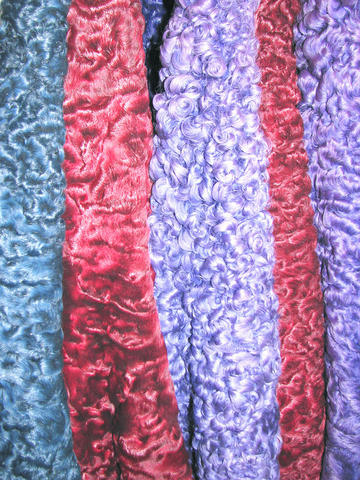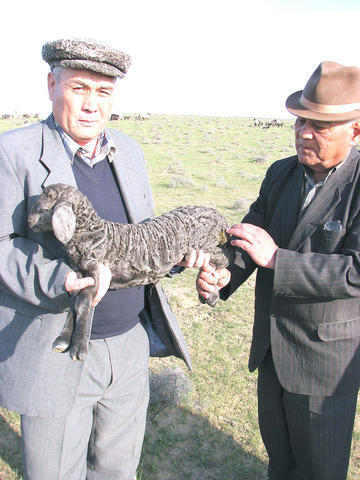A newborn karakul lamb scampers across the grass-fringed desert sand, its fur a wave of tight black curls that form a pattern as unique as human fingerprints.
Within days, the curls will unfold, become rough and wiry and turn the soft, sensuous karakul pelt -- better known as astrakhan or Persian lamb -- into cheap sheepskin.
So to save the pelt the lamb will be slaughtered and skinned before sundown -- along with dozens of others born here at the Kanimekh farm in the desert of central Uzbekistan. Eventually, the harvest of pelts will become chic coats, cuffs and collars worn by runway models and fashion victims across the globe.

PHOTO: AP
After investigators for the US Humane Society visited an Uzbek farm in 2000, they condemned the industry as "cruel, grotesque and inexcusable." But the trade has picked up sharply in recent years.
Pop singer Madonna sported a karakul coat -- until designer Stella McCartney scolded her. Celebrities like Lisa Marie Presley and Ivana Trump reportedly flaunt their karakul despite the criticism.
Activists are particularly galled by the production of karakulcha, or broadtail pelts. Every September, older ewes are artificially inseminated. The mother is slaughtered two weeks before delivery, the fetus is extracted and skinned and its body ground to feed poultry or pigs. The resulting fur resembles watered silk.

PHOTO: AP
"This method is justified, toothless ewes are destined to die of hunger anyway," said Surat Yusupov, director of the Uzbek Karakul Breeding Institute.
Shepherds say the pelts are key to their livelihood. And they point out the carcasses are not discarded: The meat is prized as a low-fat delicacy, the hooves processed for glue, the maw sold to cheese makers or pharmaceutical companies.
"We cope with life in desert and the campaigns of those activists only add to the difficulties we encounter here," said Malibek Abdukadyrov, a manager at the Kanimekh farm.
Afghan President Hamid Karzai, who has become an unlikely international fashion icon, often sports a chic karakul hat and may be partly responsible for the surge in interest in the fur. By 2004, Prada had shown a collection made of swakara, or African karakul and soon designers from Armani to Gucci presented new coats, trims, suits and skirts.
Last year, Uzbekistan sold almost 137,000 karakul pelts abroad, one third more than in 2005, reported Uzbek Karakuli, a state-run exporter. The wholesale price for each pelt climbed to US$18, while a designer coat sewn from about 30 pelts costs thousands of dollars.
The pelts may be headed to the glittering runways of Paris and Milan. But they start their journey in dilapidated facilities built in the Soviet times, when the advent of electricity and natural gas first made construction of this settlement in the Central Asian desert possible.
Karakul wool accounted for two-fifths of the Soviets' fur exports. Felt-thin and velvet-smooth, it came in a rainbow of tints ranging from black to pink to lilac, colors that were dubbed "sundown," "candlelight" or "apricot flower."
Karakul sheep first appeared hundreds of years ago in the Kyzylkum desert, around the Karakul, or Black Lake, near the ancient Uzbek city of Bukhara, said Yusupov of the breeding institute.
Bukhara's emirs maintained a world monopoly on production and export of its golden fleece -- through Persia and the Russian city of Astrakhan -- punishing would-be smugglers with decapitation.
"It was like silk for ancient China," said Kenjabai Madaminov of Uzbek Karakuli, the exporter.
Then in 1907, the last emir of Bukhara allowed the British to ship some karakul to Namibia, where the sheep became the founding herd of swakara, or Southwest African karakul. When the emir fled the Soviets in 1920, he took his best sheep to Afghanistan, now the world's leading producer of karakul.
Yusupov said, however, that Afghanistan doesn't produce the variety of karakul pelts that Uzbekistan does, because of his country's scientific breeding program. His institute, he said, has developed 28 types of karakul, five of them in recent times.
After the institute was established in 1930 in Samarkand, it opened branches and introduced sheep into other southern Soviet regions. Lambskin hats became a distinction of Communist bosses and top military, and karakul pelts sold briskly at Western fur auctions.
Production peaked in the 1970s, when about 10 million Soviet, Afghan and South African pelts were sold worldwide each year. The 1991 Soviet collapse coincided with dwindling demand for fur, and Uzbek karakul farms, now transformed into cooperatives, struggled until the early 2000s. Today, with the boom in karakul sales, Uzbekistan is the world's second largest producer after Afghanistan.
It takes a lot of human sweat and sheep blood to get the pelts to the market.
High-pitch bleating echoes throughout Kanimekh at dawn when the lambs are taken to an old barn that serves as a slaughterhouse, where butchers strip the pelts with a few swift strokes of their knives. It's like removing "a stocking," one of them said.
Men and women sitting on the ground outside the slaughterhouse rub the pelts clean with knives and scrapers. Then, the pelts are pickled in coarse salt and heaped on wooden scaffolds. For a week, fat and other fluids leach out, coloring the salt pink. Finally, the pelts are fermented with barley flour in a rotating vat filled with tepid water.
After another cleaning and grading by size, pattern and tint, the pelts are dispatched to a sewing factory or to one of about 20 state-controlled export companies.
Only male newborn lambs with specific faults and flaws -- up to a third of the flock -- are harvested for their pelts. Those spared will be fleeced twice a year, their wool used for weaving the prized Bukhara carpets, treasured fabrics as old as karakul itself.
Fur industry officials say that critics don't understand that the Kyzylkum desert is far crueler than the annual karakul harvest.
With temperatures ranging from -30oC to 50oC, the Kyzylkum is a desolate place, home to scattered bushes, wormwood and a few wild herbs. The landscape is so barren only the hardiest animals -- camels, goats and karakul sheep -- have a chance of survival.
The karakul sheep is uniquely adapted to this environment. It drinks salty water cattle reject and regulates breathing and blood density to survive the heat or cold.
"Karakul sheep are a wonder of nature," said Adham Gaziev, deputy to the director of the Uzbek Karakul Breeding Institute.
Shutting down the karakul trade would wipe out an industry that many Uzbeks depend on for their survival, Gaziev said.

DAREDEVIL: Honnold said it had always been a dream of his to climb Taipei 101, while a Netflix producer said the skyscraper was ‘a real icon of this country’ US climber Alex Honnold yesterday took on Taiwan’s tallest building, becoming the first person to scale Taipei 101 without a rope, harness or safety net. Hundreds of spectators gathered at the base of the 101-story skyscraper to watch Honnold, 40, embark on his daredevil feat, which was also broadcast live on Netflix. Dressed in a red T-shirt and yellow custom-made climbing shoes, Honnold swiftly moved up the southeast face of the glass and steel building. At one point, he stepped onto a platform midway up to wave down at fans and onlookers who were taking photos. People watching from inside

A Vietnamese migrant worker yesterday won NT$12 million (US$379,627) on a Lunar New Year scratch card in Kaohsiung as part of Taiwan Lottery Co’s (台灣彩券) “NT$12 Million Grand Fortune” (1200萬大吉利) game. The man was the first top-prize winner of the new game launched on Jan. 6 to mark the Lunar New Year. Three Vietnamese migrant workers visited a Taiwan Lottery shop on Xinyue Street in Kaohsiung’s Gangshan District (崗山), a store representative said. The player bought multiple tickets and, after winning nothing, held the final lottery ticket in one hand and rubbed the store’s statue of the Maitreya Buddha’s belly with the other,

‘NATO-PLUS’: ‘Our strategic partners in the Indo-Pacific are facing increasing aggression by the Chinese Communist Party,’ US Representative Rob Wittman said The US House of Representatives on Monday released its version of the Consolidated Appropriations Act, which includes US$1.15 billion to support security cooperation with Taiwan. The omnibus act, covering US$1.2 trillion of spending, allocates US$1 billion for the Taiwan Security Cooperation Initiative, as well as US$150 million for the replacement of defense articles and reimbursement of defense services provided to Taiwan. The fund allocations were based on the US National Defense Authorization Act for fiscal 2026 that was passed by the US Congress last month and authorized up to US$1 billion to the US Defense Security Cooperation Agency in support of the

HIGH-TECH DEAL: Chipmakers that expand in the US would be able to import up to 2.5 times their new capacity with no extra tariffs during an approved construction period Taiwan aims to build a “democratic” high-tech supply chain with the US and form a strategic artificial intelligence (AI) partnership under the new tariffs deal it sealed with Washington last week, Taipei’s top negotiator in the talks said yesterday. US President Donald Trump has pushed Taiwan, a major producer of semiconductors which runs a large trade surplus with the US, to invest more in the US, specifically in chips that power AI. Under the terms of the long-negotiated deal, chipmakers such as Taiwan Semiconductor Manufacturing Co (TSMC, 台積電) that expand US production would incur a lower tariff on semiconductors or related manufacturing